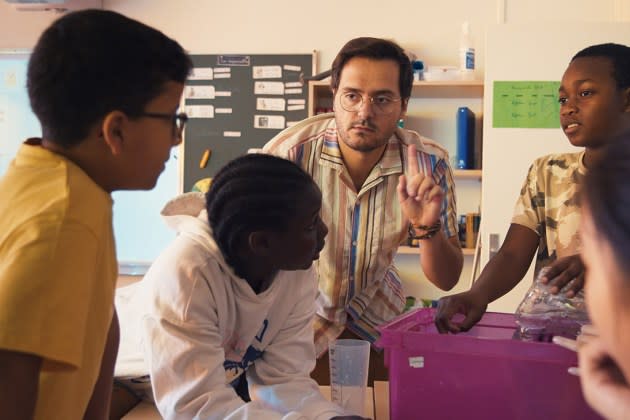‘Elementary’ Review: Claire Simon’s Compassionate Study of French Public Education
- Oops!Something went wrong.Please try again later.

From the opening moments of Elementary (Apprendre), Claire Simon establishes a quiet respect for her primary-school-aged subjects. The camera stays low, framing the excited, nervous and eager faces of students on the first day of class at Makarenko Public Elementary School in the Parisian suburb of Ivry-sur-Seine. As the mother of one particularly shy student speaks to a teacher, Simon, assuming the perspective of the young kid, tilts her camera upward to look at the pair.
Elementary, which premiered at Cannes as a special screening, marks Simon’s return to Ivry-sur-Seine and the subject of student lives. Before last year’s Our Body, her unflinching documentary about healthcare in France, the director documented the rough social dynamics of kindergartners in Récréation (1998) and the competitive admissions process at France’s La Femis filmmaking academy in The Graduation (2016). And in 2018’s Young Solitude, Simon intimately observed the valences of adolescent angst and alliances through a group of high schoolers in Ivry-sur-Seine.
More from The Hollywood Reporter
Gary Oldman Clarifies 'Harry Potter' Criticism: "I Only Had One Book in the Library of Sirius Black"
Elementary is a quieter and more distant work than Our Body, but it is no less poignant. The film gains a greater resonance when considered within the context of the French public school system, which suffers from chronic underfunding.
As in her previous films, Simon eschews talking heads for a more fly-on-the-wall approach. There are no contextual interstices briefing audiences on the state of public schools in France or pauses to explain the history of Makarenko public elementary, which sits outside Paris, in a suburb populated by working-class and immigrant residents. The politics of Ivry-sur-Seine — its communist roots and recent demographic changes — are only suggested. Simon trusts viewers to follow along, and this unfussy approach means that Elementary’s lessons can be applied widely. The film will likely be well-received in France, but it could have a life in the U.S., where public education is also in crisis. Through this doc, Simon champions a holistic, care-centered education model and underscores the dignity of teaching as a profession.
Teachers at Makarenko approach their job with an understanding of the linked lives between home and school. Early in the film, one instructor reassures a parent about enrollment documents and supplies, telling the mother that he can get her son a backpack and other necessities. In a later scene, another teacher warns students not to disturb a child who has fallen asleep in class. He needs his rest, she says to the room before walking the rest of the group through an activity. When an autistic student needs a break from the stimulation of the classroom, we see a teacher take the child to the playground, where he rides around in circles on his scooter.
Through these moments, Simon shows how public school teachers are more than just tutors; they are caregivers, too. Their approach aligns with the theories of the Soviet educator Anton Makarenko (one wonders if the school is named after him), who believed that the teacher’s task was to direct the development of a child as they exist in this “highly complex world of ambient activity” and infinite ways of relating to others. The reality of that responsibility is not always easy, and although Simon’s doc is firmly optimistic, the filmmaker does balance these scenes of alternative learning with ones in which the teachers also struggle.
Elementary moves in a loosely chronological order — starting with the first day of school and closing with a graduation ceremony for its oldest pupils. In between these points, Simon meanders through the halls, loiters on the playground and dips in and out of classrooms. Even when she offers glimpses of the teachers’ dedication, Simon insists on the students as subjects. Most of Elementary observes children learning how to negotiate their existence and relationships in the classroom. Moments witnessed on the playground remind us of the casual cruelty of social orders and how young people are when they start defining themselves against others.
An interesting thread in Elementary that might have benefited from more development is the subject of religion. A classroom conversation about faith inspires a spirited debate among Muslim students about their own spiritual practices. The moment is crucial considering rampant Islamophobia, but it feels too fleeting in Elementary. It’s one of the rare instances where Simon’s approach feels more slight and skittish than deeply considered.
Still, Elementary is an accomplished project. Not only does Simon meet these students on their own terms — she also handles their trust with an inspiring level of care.
Best of The Hollywood Reporter
